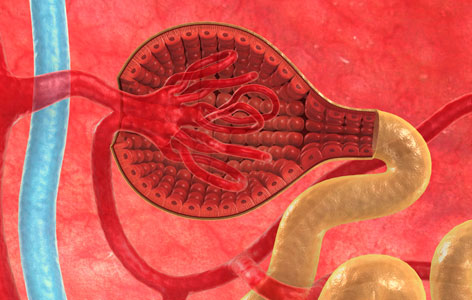
The kidneys perform a key function in the body: they filter waste products from the blood, while keeping in molecules that the body needs.
When the filters in the kidney (known as glomeruli) malfunction, a group of kidney diseases known as glomerulonephritis (GN) develop. For patients with GN there is often a lack of symptoms making it difficult for doctors to assess the progression of the disease. To help diagnose the stage of the disease and gain insight into outcomes, doctors measure proteins that leak from the blood into to the urine from damaged glomeruli—a phenomenon known as proteinuria.
Unfortunately, there is no consensus on how to measure the degree of proteinuria or whether one approach is better at identifying people at risk of developing serious kidney disease. To address this issue, TGHRI Scientist Dr. Heather Reich and Dr. Sean Barbour at the University of British Columbia led a study that assessed eight different ways of measuring proteinuria in 1,351 patients with GN.
The research team found that, at any given time, the best method to predict the long-term risk of kidney failure is to simply consider the most recent proteinuria measurement, rather than taking an average of multiple measurements or correcting the measurements for body size, as is sometimes done in the clinic.
"We found that some of the most frequently used ways of measuring proteinuria actually biased the diagnostic usefulness of the readings by up to 30%. Widespread adoption of the method that we identified as the most accurate would serve to better diagnose and monitor of patients with this disease, which would ultimately improve the care that they receive."
This work was supported by the Carraresi Foundation and the Toronto General & Western Hospital Foundation.
Identifying the ideal metric of proteinuria as a predictor of renal outcome in idiopathic glomerulonephritis. Barbour SJ, Cattran DC, Espino-Hernandez G, Hladunewich MA, Reich HN. Kidney International. 2015 Aug 19. [Pubmed abstract]




